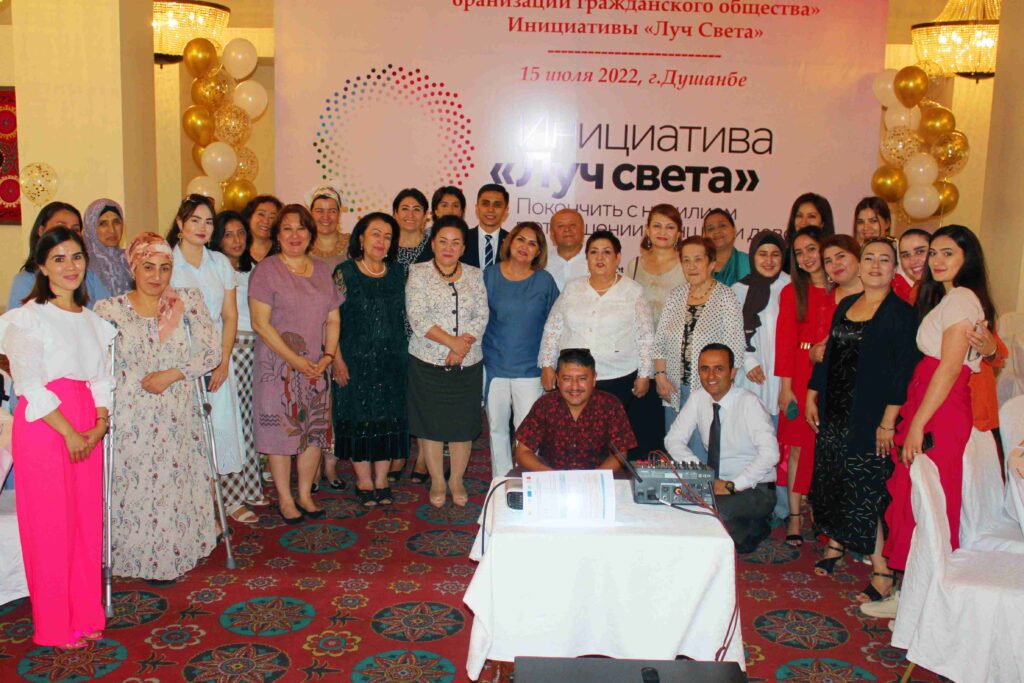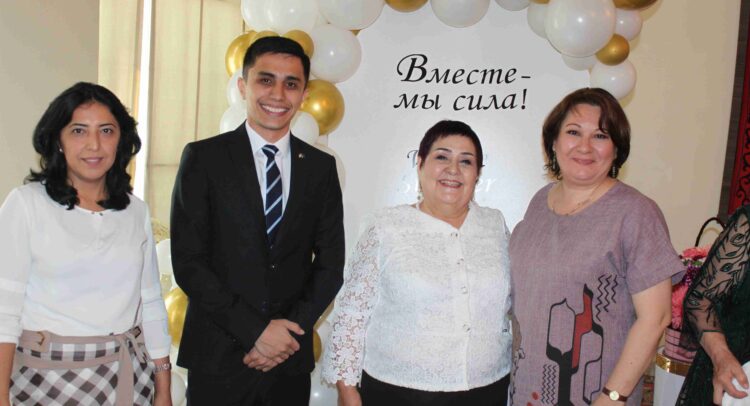The final information session of the sixth component of the Spotlight Initiative became a successful platform for showcasing best practices and key results in supporting the women’s movement and civil society organizations. The Spotlight Initiative in Tajikistan is a joint initiative of the EU and the United Nations to eliminate violence against women and girls.
The final reporting event, held successfully on July 15 this year at the Serena Hotel, was dedicated to presenting and discussing significant achievements in establishing the School of Gender Activists, developing a civil society strategy aimed at behavioral changes related to gender-based violence, and implementing strategic initiatives to prevent violence against women and girls. A comprehensive package of advisory and practical measures in this area was implemented by UN Women in partnership with the public organization “Gender and Development.”
Partners and beneficiaries of the initiative participated actively in the event. These included representatives of the United Nations and the European Union in Tajikistan, country offices of UN Women and UNDP, the Committee on Women and Family Affairs under the Government of the Republic of Tajikistan, members of the Spotlight Programme Advisory Board, the Coalition of Tajik NGOs “From Legal Equality to Factual Equality,” and the Consultative Council of Sughd-based NGOs, as well as leaders and experts of civil society organizations and media representatives, including the Media Council of Tajikistan.
The establishment of the School of Gender Activists and the training of 20 gender specialists became a key result of the initiative. Graduates of the school received substantial knowledge and skills in legal frameworks, practical mechanisms, and current trends and approaches in combating gender-based violence. Their experience and knowledge were successfully shared through cascade trainings conducted in their communities, reaching more than 200 girls, women, and men, including vulnerable groups such as persons with disabilities, women living with HIV, and low-income families. According to Diana Ismailova, Programme Coordinator at UN Women, the School’s success is a valuable experience that will be continued and expanded during the second phase of the project.
The strengthened and constructive cooperation of several civil society organizations led to the development of the Civil Society Organizations Strategy and Action Plan aimed at driving behavioral changes around gender-based violence and implementing preventive initiatives. Gender expert Gulnora Beknazarova emphasized that this is a unique document uniting the efforts of all organizations working to combat and eliminate violence against women and girls. Over 40 CSOs engaged in protecting the rights of women and children have endorsed the core principles of the CSO Strategy and are striving to align their actions with its objectives.
According to Makhabo Olimi, Spotlight Programme Coordinator from the Committee on Women and Family Affairs under the Government of Tajikistan, the achievements complement national efforts to advance women’s rights and contribute to strategic goals of increasing women’s participation in decision-making processes. Project manager Viloyat Mirzoeva noted that these impressive results were made possible thanks to close cooperation with government agencies, international and civil society organizations, particularly acknowledging the strong support from the Committee on Women and Family Affairs and its local branches in the pilot districts.
Grants were awarded to six innovative and impactful projects in pilot cities and districts aimed at building new behavior patterns based on zero tolerance for violence and discrimination against women and girls. More than 4,000 individuals — schoolchildren, students, activists, government staff, and members of civil society organizations, including those from vulnerable groups — participated in project activities that helped foster new understanding of gender-based violence and contributed to establishing zero tolerance for its manifestations. A series of thematic video materials and programs were also broadcast on radio, television, and social media.
Nargis Saidova, Director of “Gender and Development,” highlighted that the project’s awareness-raising and training efforts helped many women and girls to reevaluate their lives and strive for positive changes.
“The collective efforts and productive cooperation between international organizations and national partners have created a healthy environment for women and girls and laid a strong foundation for future actions to eliminate violence and discrimination,” stated Amirbek Saidbekov, EU Programme Coordinator in Tajikistan.
The final session also provided an opportunity for partners and beneficiaries to share their suggestions and recommendations for scaling up successful practices and lessons learned that could help reduce violence against women and girls in other regions of the country.
During the session, a Memorandum of Cooperation was signed within the framework of the “Life Without Violence” network to implement the Strategy on Behavioral Change and Prevention of Violence Against Women and Girls. The memorandum text is attached, and the network remains open to new members.
For all inquiries regarding the Strategy and membership in the network, please contact:
- Guljahon Bobosadikova, Chairperson of the Coordination Network: bguljaon@mail.ru
- Viloyat Mirzoeva, Secretariat of the network / “Gender and Development”: viloyat.mirzoeva@mail.ru
- Nozanin Rasulova: nozanin.rasulova@gender.tj
The Work Plan of the Network for July–December 2022 is also attached for follow-up actions by network members.




